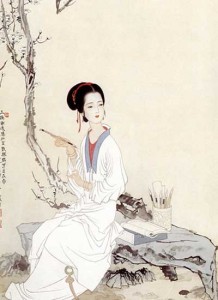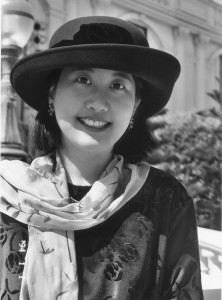(Li Qingzhao & Karen An-hwei Lee)
A coincidence. Seeking a rare vision of grace in the ash of war, exile, and a ruined economy, my eye fell upon a Song Dynasty woman poet’s writings via an ideogram shared by our last names: 李. As far as equivalencies between our languages, her last name and mine are one and the same.
Her full name: Li Qingzhao.
As a girl, I knew about the Tang Dynasty male poet Li Bai or Li Po, whose famous poem on moonlight I memorized and recited. I was new to a woman poet named Li. I found Li Qingzhao while perusing Dorothy Disse’s on-line archive, Other Women’s Voices: Translations of Women’s Writing before 1700. Romanized, Li Qingzhao’s beautiful surname is also spelled Ching-ch’ao.
For Anglophone tongues, the third syllable is close to “ts” in “tse-tse fly.”
Li adored her husband Zhao Mingcheng, who shared her literary interests. Li was perpetually in love with him. They collected art and played “poetry games.” After composing a line or identifying a quotation, the winner drank a cup of tea, which Li occasionally spilled on herself, laughing aloud. She took pleasure in book-collecting, observing chrysanthemums and pear blossoms, or sitting quietly with a burning censer after dusk.
Li wrote original poems set to the tune of popular songs called ci.
Lyrical and passionate, her work stands apart from Song Dynasty women who chose to write stylized verse framed by imperial culture. At once intimate and universal, Li voices a timeless reality: Love, memory, and loss are integral to human experience. Indeed, her life of writing and art-collecting was doomed by the political instabilities of her time. After the fall of the Northern Song Dynasty, she and Zhao fled into exile as their possessions were reduced to ash.
My desire is for Li’s voice to sing in these translations.
She recalls a youthful boating excursion with joy, observes a courtyard plantain tree flourish in her southern exile, listens to rain on the leaves of a parasol tree, watches for the first signs of yellow chrysanthemums, or alludes to her late husband with tender regret while her own hair silvers at the temples. In this trio, her solitude is quite transparent in a reference to the mythic peng bird who soars on wind over water for ninety thousand li.
Certainly, I am not the first translator of Li’s work, nor the last.
My deep respect goes to the historians Beata Grant, Wilt Idema, Kang-I Chang, and Haun Saussy, who translated and anthologized many of Li’s writings, circulating them in the West. Arthur Sze eloquently translated a number of Li’s poems. Heartfelt thanks to Lucy Chao, Lu-sheng Chong, and Dorothy Disse for their digital treasuries of Li’s poetry in the 21st Century.
—Karen An-hwei Lee
漁家傲
by Li Qingzhao
天接雲濤連曉霧,
星河欲轉千帆舞﹔
彷佛夢魂歸帝所,
聞天語,
殷勤問我歸何處。
我報路長嗟日暮,
學詩漫有驚人句﹔
九萬里風鵬正舉,
風休住,
蓬舟吹取三山去。
To the Tune of Yu Jia Ao: The lofty fisherman
by Li Qingzhao
When the sky, mist, and waved clouds mingle at dawn,
when a star-laden river, the Milky Way, wheels
in the dance of a thousand sails,
then my spirit, in a dream, drifts to the empyrean,
listening to heaven’s voice
gently asking me about a journey:
What is your desire?
I answer with a sigh: The road is long at dusk;
I’ve studied poetry intently,
even written a few startling lines.
Yet the powerful peng bird
soars high for ninety thousand li
on pure wind, unceasing wind,
as I desire to send my little boat
three mythic mountains away.
translated from Chinese by Karen An-hwei Lee
more>>
漁家傲
by Li Qingzhao天接雲濤連曉霧,
星河欲轉千帆舞﹔
彷佛夢魂歸帝所,
聞天語,
殷勤問我歸何處。
我報路長嗟日暮,
學詩漫有驚人句﹔
九萬里風鵬正舉,
風休住,
蓬舟吹取三山去。
To the Tune of Yu Jia Ao: The lofty fisherman
by Li QingzhaoWhen the sky, mist, and waved clouds mingle at dawn,
when a star-laden river, the Milky Way, wheels
in the dance of a thousand sails,
then my spirit, in a dream, drifts to the empyrean,
listening to heaven’s voice
gently asking me about a journey:
What is your desire?
I answer with a sigh: The road is long at dusk;
I’ve studied poetry intently,
even written a few startling lines.
Yet the powerful peng bird
soars high for ninety thousand li
on pure wind, unceasing wind,
as I desire to send my little boat
three mythic mountains away.
translated from Chinese by Karen An-hwei Lee
一剪梅
by Li Qingzhao
紅藕香殘玉簟秋。
輕解羅裳,
獨上蘭舟。
雲中誰寄錦書來?
雁字回時,
月滿西樓。
花自飄零水自流。
一種相思,
兩處閒愁。
此情無計可消除,
才下眉頭,
卻上心頭。
To the Tune of Yi Jian Mei: Cutting a plum flower branch
by Li Qingzhao
Fragrant traces of red lotus
linger autumnal on my jade mat.
Gently I unfasten my silk clothes
in solitude aboard the orchid boat.
Who sends a brocaded letter through the clouds?
Messenger birds return this season, writing their flight
across a full moon over the western chamber.
By nature, petals drift in the wind, and water flows.
One kind will cling to its own:
In two places, though, with sorrows of leisure spent apart,
mourning descends my brow
only to climb aboard my heart.
translated from Chinese by Karen An-hwei Lee
more>>
一剪梅
by Li Qingzhao紅藕香殘玉簟秋。
輕解羅裳,
獨上蘭舟。
雲中誰寄錦書來?
雁字回時,
月滿西樓。
花自飄零水自流。
一種相思,
兩處閒愁。
此情無計可消除,
才下眉頭,
卻上心頭。
To the Tune of Yi Jian Mei: Cutting a plum flower branch
by Li QingzhaoFragrant traces of red lotus
linger autumnal on my jade mat.
Gently I unfasten my silk clothes
in solitude aboard the orchid boat.
Who sends a brocaded letter through the clouds?
Messenger birds return this season, writing their flight
across a full moon over the western chamber.
By nature, petals drift in the wind, and water flows.
One kind will cling to its own:
In two places, though, with sorrows of leisure spent apart,
mourning descends my brow
only to climb aboard my heart.
translated from Chinese by Karen An-hwei Lee
行香子, 七夕
by Li Qingzhao
草際鳴蛩,
驚落梧桐,
正人間天上愁濃。
雲階月地,
關鎖千重。
縱浮媼槎來,
浮槎去,
不相逢。
星橋鵲駕,
經年纔見,
想離情別恨難窮。
牽牛織女,
莫是離中。
甚霎兒晴,
霎兒雨,
霎兒風。
To the Tune of Xing Xiangzi, Qi Xi: Fragrance in motion, seven dusks
by Li Qingzhao
Evening crickets chirp in the grass
while leaves drop from the parasol tree,
startling. This season of sorrow
intensifies on earth as in heaven.
Clouds are stairways, moonlight is earth,
yet our way is sealed by a thousand locks.
If floating rafts were to journey
between sea and sky, still
never would the two meet.
A star-laden bridge made by magpies
for one annual tryst recalls in heaven
the trials of our separation, endless regrets:
A cattle hand and weaver maiden, in love,
face to face once a year on the celestial bridge.
Perhaps this is why, with our partings,
our emotions clear for only an instant,
followed by sudden rain,
sudden wind.
translated from Chinese by Karen An-hwei Lee
more>>
行香子, 七夕
by Li Qingzhao草際鳴蛩,
驚落梧桐,
正人間天上愁濃。
雲階月地,
關鎖千重。
縱浮媼槎來,
浮槎去,
不相逢。
星橋鵲駕,
經年纔見,
想離情別恨難窮。
牽牛織女,
莫是離中。
甚霎兒晴,
霎兒雨,
霎兒風。
To the Tune of Xing Xiangzi, Qi Xi: Fragrance in motion, seven dusks
by Li QingzhaoEvening crickets chirp in the grass
while leaves drop from the parasol tree,
startling. This season of sorrow
intensifies on earth as in heaven.
Clouds are stairways, moonlight is earth,
yet our way is sealed by a thousand locks.
If floating rafts were to journey
between sea and sky, still
never would the two meet.
A star-laden bridge made by magpies
for one annual tryst recalls in heaven
the trials of our separation, endless regrets:
A cattle hand and weaver maiden, in love,
face to face once a year on the celestial bridge.
Perhaps this is why, with our partings,
our emotions clear for only an instant,
followed by sudden rain,
sudden wind.
translated from Chinese by Karen An-hwei Lee

